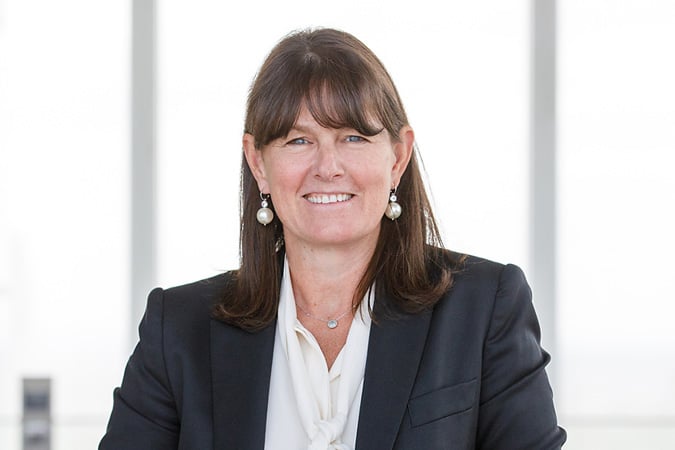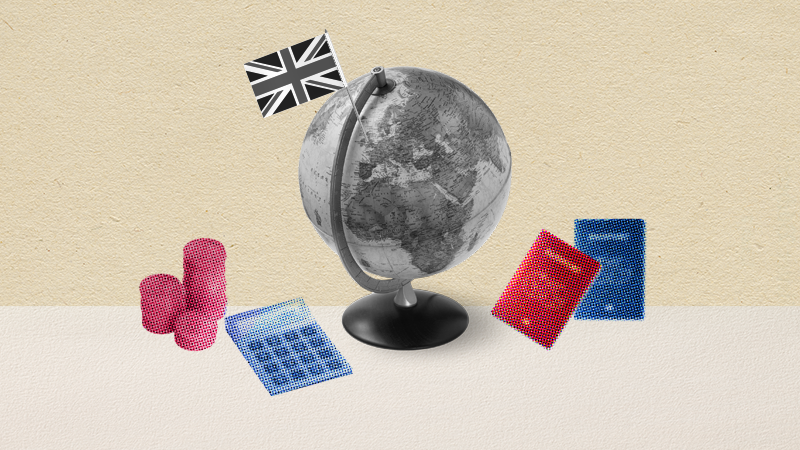A global perspective
Foreword
Globalisation is a peculiar thing.
On the one hand, it’s made the world a much bigger place. Advances in technology and transport mean that we’re able to explore every corner of the planet, from the highest Himalayan peaks to the deepest depths of the Mariana Trench.
As a result, we have opportunities to expand our horizons that our ancestors could only have dreamed of.
At the same time, globalisation has also made the world feel much smaller and interconnected – more familiar almost. Even the farthest-flung countries are usually less than 24 hours’ travel away, and after stepping off the plane, we’re greeted by the same Nike stores, McDonald’s branches and Apple smartphones that we see back home.
It’s a similar story with investing. Today, the investment universe is enormous, presenting us with a dizzying array of possibilities. And yet, accessing global markets has never been easier.
The question becomes: how do we identify the best investments when there are so many opportunities to choose from?
To understand which investments offer real value over the long term, we believe it’s essential to have a truly global perspective.
In this Quarterly Letter, we explain what that means to us, drawing on some of our favourite stories and anecdotes from the Rothschild Archive to illustrate our long history as a global business.
We hope you enjoy reading it; we certainly enjoyed writing it.
Helen Watson
CEO, Rothschild & Co Wealth Management UK
A global perspective
Italian merchant Marco Polo spent nearly 25 years travelling across Asia at the end of the 13th century. He was not the first European to witness the wonders of the East, but the stories he brought back were so captivating that a book about his adventures, The Travels of Marco Polo, became the pre-printing era’s equivalent of a bestseller.
As a trusted emissary of the Mongol emperor Kublai Khan, Polo was given a medieval passport – a golden tablet with the royal seal that guaranteed him safe passage and board anywhere within the Khan’s sprawling empire.
His experiences along the Silk Road, a vast network of trade routes that linked Asia to Europe, gave him incredible insight into international communities and cultures in a world that was on the brink of going global.
Some of Polo’s adventures were almost too fantastical to believe; he spoke of giant unicorns, sheets of paper as valuable as gold, and black stones that burned better than wood. His outlandish claims led doubters to dub The Travels of Marco Polo – titled Il Milione (‘The Million’) in Italian – the book of ‘a million lies’.
However, many of the explorer’s tall tales were eventually proven true. The magical black stones were coal, which wasn’t widely used in Europe at the time. The priceless pieces of paper were Yuan dynasty banknotes. And the unicorns? Most likely Javan rhinoceroses.
While Polo’s contemporaries were sceptical (and several of his anecdotes were undoubtedly embellished), he was nevertheless a crucial conveyor of innovative ideas and novel customs from distant lands, many of which would eventually be adopted in Europe. He traded in information and knowledge as much as he did in fine silks, rare spices and precious gemstones.
The fact that Marco Polo’s name is still so recognisable today, more than 700 years later, is a testament to the long-term value of looking beyond your own borders.
The Rothschild family’s documented history may not stretch back quite as far as the 13th century, but a global perspective has always been fundamental to the family’s outlook.
The earliest identified Rothschild ancestor is ‘Uri Feibesh’, who lived in Frankfurt in 1450.
Ever since Mayer Amschel Rothschild sent his middle son, Nathan, to set up the family’s first overseas office in the UK in 1798, the Rothschilds have succeeded in developing strong, enduring relationships and networks worldwide. That work continues today at Rothschild & Co, not only in how we build businesses with a global reach, but also in our investment approach and philosophy.
The earliest identified Rothschild ancestor is ‘Uri Feibesh’, who lived in Frankfurt in 1450."
Financing a new nation
In 1822, Brazil declared independence from Portugal. Nathan Rothschild was instrumental in arranging a loan that helped the fledgling nation find its financial footing in those early years, with Portugal formally recognising Brazil’s independence in 1825.
Nathan’s keen interest in the country didn’t end there. He also raised a £400,000 loan in 1829 that enabled Brazil to service its debts. This bond is believed to be the first of its kind, and it allowed Brazil to remain relatively solvent when the speculative bubble burst in South America during the 1820s.
The Rothschild family continued to show confidence in Brazil throughout the 19th and 20th Centuries, issuing loans to support the country’s infrastructure, railways and coffee exports.
A GLOBAL BUSINESS: THEN AND NOW
Nathan was the first of Mayer Amschel’s sons to establish the family name abroad, but it wasn’t long before his siblings followed suit.
By 1821, three of Nathan’s brothers had also put down roots in Europe’s key financial capitals – James in Paris, Salomon in Vienna and Carl in Naples. The eldest brother, Amschel, stayed at home and took over the Frankfurt House of the Rothschild’s banking business after his father died in 1812.
A few years prior, Nathan had founded N M Rothschild & Sons at New Court, St Swithin’s Lane, which we are proud to say remains the home of the London operation and the Rothschild Archive to this day.
Much has changed at Rothschild & Co during that time, but many of our guiding principles have remained the same. Our commitment to maintaining a global perspective, for example, is as strong today as it’s ever been.
We firmly believe in having people on the ground to support our clients, wherever they are or wherever their business takes them.
A global reach is also key to helping us preserve and grow your wealth over the long term, as we can allocate our extensive resources to search for the best investment opportunities in whichever asset class, sector or country they may be.
Before we explain how we do that, we’d like to talk a bit more about why a global perspective is important.
From banking to Bordeaux
The banking industry is where the Rothschild family first established a reputation for trust, integrity and excellence. But the family name is also indelibly linked to the world of wine-making – a global legacy that was born and nurtured in the vineyards of Bordeaux.
Château Lafite Rothschild, acquired by James Mayer Rothschild in 1868, is the most well-known of the family’s prestigious wine estates. Château Lafite and the neighbouring Château Mouton Rothschild both have Premier Cru (First Growth) status, which is only bestowed upon Bordeaux wines of the highest quality.
However, the family’s wine portfolio extends far beyond France. Today, the Rothschilds have wine-making ventures in Portugal, the US, Chile and China.
Lost in translation
What do the Stone Roses, Jamie Oliver and Tesco have in common?
They were all hugely popular in the UK but were unable to achieve the same success in the US because they misunderstood overseas markets.
The Stone Roses chose not to tour the US after their breakthrough album, believing this would build anticipation for when they finally performed in the country. They were wrong, and lead vocalist Ian Brown would eventually claim “America doesn’t deserve us yet” when they failed to make a splash stateside.
Jamie Oliver was already a household name in the UK when he embarked on a crusade to promote healthier school dinners, but he faced a frosty reception when he launched a similar campaign in the US. It turned out Americans didn’t want to be pushed on their eating habits from a relatively unknown British chef.
Tesco’s foray into the US grocery retail market was similarly ill-fated. The supermarket chain first established its Fresh & Easy stores on the country’s west coast in 2007, hoping to compete with Walmart and Trader Joe’s.
Aside from the unfortunate timing (the Global Financial Crisis was just around the corner), the project was hampered by strategic errors.
American shoppers found the stores cold and unwelcoming, for a start. Tesco also failed to embrace the US ‘coupon culture’, and many consumers thought the Fresh & Easy brand sounded like a deodorant.1
The supermarket withdrew from the US in 2013, having reportedly lost £1.8 billion.
Tesco isn’t the only company that has struggled to adapt to overseas markets though. US retailer Home Depot found it notoriously difficult to make inroads in China, with analysts claiming it was because Chinese consumers don’t have the same ‘do it yourself’ tradition as Americans or Europeans.
IKEA, on the other hand, with its flat-pack furniture and stylish showrooms, has gone from strength to strength in China by offering simple, ready-made interior designs that families can easily transplant into their homes.
Historic partners
At Rothschild & Co, our local expertise and connections have been developed over hundreds of years, and many of our relationships have stood the test of time.
As an example, in 2005, we renewed a historic partnership with Jardine, Matheson & Co, a Hong Kong-based family-owned business that we first began a business relationship with, in Asia, nearly 200 years ago.
What do these examples tell us? Firstly, there are dangers to overestimating your appeal to an unfamiliar audience. But just as importantly, knowing the unique customs, practices and behaviours of markets and consumers worldwide is crucial to understanding how businesses in those markets are likely to perform.
This is as true for investors in those companies as it is for the companies themselves.
BUILDING A GLOBAL INVESTMENT PORTFOLIO
As many of our clients will know, we build portfolios from the bottom up.
We look for competitively advantaged companies and funds that have attractive economics and are run by skilled management teams who we can think of as long-term partners who we believe can grow profitably and build value over at least the next five to ten years.
Unsurprisingly, these businesses and funds are extremely rare. That’s why it’s essential that our investment approach isn’t hampered by geographical constraints, affording us the freedom to own the best of the best companies wherever they are in the world.
It may seem contradictory, but our global reach and bottom-up approach allow us to be geographically agnostic.
We don’t adhere to strategic asset allocation and don’t set target allocations for particular countries or markets. It is therefore not unusual for our portfolio to be weighted towards certain geographical areas if they happen to have a higher concentration of companies with the specific characteristics that we’re interested in.
For example, US-based businesses currently comprise nearly 60% of our growth-oriented return assets because North America is a sophisticated market with a generous number of high-quality, well-managed businesses.
Nevertheless, circumstances can change quickly, and a global presence enables us to incorporate new information into our thinking and analysis as soon as possible.
We already conduct deep, continuous research into all our investments or potential investments, which involves a not insignificant amount of reading. Trade journals, media publications and companies’ annual reports can all help to inform our investment decisions.
But there’s no substitute for seeing with our own eyes how a company and its management team operate. The same can be said for meeting face-to-face with current (and former) employees, suppliers, distributors, competitors and customers.
Our research teams are regularly on the road, taking tours of offices, factories and plants across the globe. They speak to regional and national subject matter experts throughout our international network, while also working to grow that network by attending industry events and conferences.
However, despite our global perspective, we recognise that we don’t have a monopoly on ideas or talent, which is why it’s important to partner with specialists who can help us identify the best investments worldwide.
ON LOCATION: LAB RESEARCH WITH EUROFINS
Eurofins, which provides lab testing services across many different industries, has been in our portfolios since November 2020, and we’re always keen to learn more about how our investee companies operate day to day.
In November 2022, our portfolio managers and analysts were invited to tour two new Eurofins laboratories, one in the UK’s Heathrow and the other in Madison, Wisconsin.
Our teams were given full site tours to understand the capabilities and technologies in the new labs. We not only met CEO Gilles Martin, who led the Heathrow tour himself, but also the company’s CEOs of food and environmental testing for both the US and Europe.
It was encouraging to see how proud Gilles was of the new labs and how well he interacted with his staff. However, as inspiring as he is, we are also aware of key man risk, so we were pleased to meet the next rung of management in person and see how competent they were. As a result, we came away more confident with the business, its senior management and our investment.
TRUSTED PARTNERS WORLDWIDE
Throughout our history, Rothschild & Co has maintained a robust network of agents and partners that have acted as our eyes and ears on the ground in regional markets where there are untapped investment opportunities.
Today, that approach lives on in our relationship with third-party fund managers, who possess unique insights and local connections in places where we don’t necessarily have a strong presence ourselves.
We see these external managers as our partners rather than suppliers. Essentially, they’re an extension of our own teams, complementing our expertise and skills while often sharing our broader investment philosophy and long-term view.
Some of our third-party managers operate in mature economies, such as Bares Capital in the US. Like us, the Bares team seek businesses with sustainable competitive advantages, excellent leadership and clear potential for growth.
Bares has improved our broader knowledge of US markets and investments, supplementing our in-house analysis across a range of areas, including mid-cap tech companies and complex software platforms.
These insights are an invaluable part of our relationships with external managers, particularly in emerging markets where our ability to tap into attractive investment opportunities may be constrained by language barriers or significant cultural differences.
Investing in Asia
Asia is made up of approximately 50 countries with a collective population of close to 4.5 billion people who speak roughly 2,300 different languages. It perhaps goes without saying, then, that its consumer base is pretty diverse.
Finding the best opportunities across such a complex investment ecosystem isn’t easy – a deep understanding of regional market trends, business practices and consumer preferences is essential to recognising the real value of companies.
Our research teams are regularly on the road, taking tours of offices, factories and plants across the globe."
Fortunately, our close working relationships with several external managers allow us to generate returns from their well-researched investments in high-growth Asian businesses, as well as extend our own local knowledge and expertise.
Cederberg Capital operates specifically in China, while Ward Ferry and Albizia Capital focus on opportunities across the wider ASEAN and Asia Pacific regions. These partnerships have been extremely active, with our research teams regularly visiting Asia to learn more about the companies that impress our third-party fund managers.
Recently, Albizia invited our portfolio managers to Indonesia, where the Singapore-based firm introduced us to several businesses from the portfolios they run for us. This included DIY stores Depo Banguan and Mitra 10, as well as Cimory, Indonesia’s leading producer of premium dairy products.
Indonesia, a country comprising more than 17,000 islands, is home to approximately 270 million people and has at least 700 indigenous languages.
Cimory has grown its brand through influencers and direct household selling, so when our team met with them, we not only talked to senior managers, but also to some of the 4,000 women who go door to door advertising the company’s wares.
We returned home with a much higher conviction in Indonesia as an investment opportunity. It’s a huge market, with a youthful population and growing incomes.
Our people on the ground saw first-hand some of the challenges that businesses face and how the best companies successfully navigate them.
Meeting the people who run and work for these businesses, many of which are family owned like us, gives us confidence that they will be able to maintain and defend their competitive advantages for the foreseeable future.
We were also able to witness the excellent commercial relationships that Albizia has developed in the region, confirming that our faith in them as a trusted partner continues to be well placed.
Final thoughts
A global perspective has always been at the heart of how we do business. While many companies have a global presence today, few can say that’s been the case for more than 200 years.
Admittedly, Jules Verne’s protagonist Phileas Fogg made it around the world in 80 days, but in our defence, he was more of a tourist (and a fictional one at that).
Our journey has been slower and steadier, although the foundations we have laid along the way are that much stronger for it.
As they say, however, a picture is worth a thousand words. So we’d like to leave you with an illustrated timeline (below) of some our key historical milestones from across the globe.
Citations
[1] The Business Environment: A Global Perspective, p10–11
Dieses Dokument wird von Rothschild & Co Wealth Management UK Limited lediglich zu Informations- und Marketingzwecken und nur für den persönlichen Gebrauch des Empfängers herausgegeben. Es darf weder vollumfänglich noch teilweise kopiert, reproduziert, verbreitet oder an Dritte weitergegeben werden, sofern Rothschild & Co Wealth Management UK Limited dem nicht im Voraus ausdrücklich schriftlich zugestimmt hat. Dieses Dokument stellt weder eine persönliche Empfehlung noch ein Angebot oder eine Aufforderung zum Kauf oder Verkauf von Wertpapieren, Bank- oder Anlageprodukten dar. Nichts in diesem Dokument stellt eine Anlage-, rechtliche, buchhalterische oder steuerliche Beratung oder eine Zusicherung dar, dass eine Anlage oder Strategie für die jeweiligen persönlichen Umstände angemessen oder geeignet ist.
Der Wert einer Kapitalanlage sowie der mit ihr erzielte Ertrag kann sowohl steigen als auch sinken, und Anleger erhalten den investierten Betrag unter Umständen nicht in vollem Umfang zurück. Die in der Vergangenheit erzielte Performance ist kein zuverlässiger Massstab für die künftige Wertentwicklung. Der Wert einer Kapitalanlage und die mit ihr erzielten Erträge können im Falle von Anlagen in Auslandswährungen aufgrund von Wechselkursänderungen steigen oder sinken. Investitionen in Schwellenmärkten können grösseren Risiken unterliegen. Bei Portfolios, die in Anlagen und andere festverzinsliche Wertpapiere investieren, können Zinsänderungen zu Wertverlusten führen. Hedgefonds setzen häufig Fremdkapital ein; die Aufnahme von Krediten zur Ertragssteigerung und andere spekulative Anlagepraktiken erhöhen das Risiko von Anlageverlusten.
Die Informationen und Daten in diesem Dokument stammen aus Quellen, die als zuverlässig angesehen werden; dennoch haftet oder garantiert Rothschild & Co Wealth Management UK Limited weder jetzt noch zukünftig und weder ausdrücklich noch implizit für die Zuverlässigkeit, Richtigkeit oder Vollständigkeit dieses Dokuments oder der Daten, die diesem Dokument zugrunde liegen und übernimmt keine Verantwortung dafür, dass irgendeine Person auf die Angaben in diesem Dokument vertraut; ausgenommen sind Fälle von Betrug. Im Besonderen wird keine Haftung oder Garantie für die Erreichung oder Angemessenheit zukünftiger Prognosen, Ziele, Einschätzungen oder Vorhersagen, die dieses Dokument enthält, übernommen. Darüber hinaus können alle in diesem Dokument zum Ausdruck gebrachten Meinungen und Daten ohne vorherige Ankündigung geändert werden.
Handelt es sich bei der Datenquelle in dieser Präsentation um MSCI, sind wir verpflichtet Ihnen als Nutzungsbedingung Folgendes mitzuteilen: „Weder MSCI noch eine andere an der Zusammenstellung, Errechnung oder Erzeugung der MSCI-Daten beteiligte Partei leisten ausdrückliche oder indirekte Gewährleistungen oder Zusicherungen in Bezug auf diese Daten (oder die infolge ihrer Nutzung zu erzielenden Ergebnisse), und sämtliche Parteien lehnen hiermit ausdrücklich sämtliche Gewährleistungen in Bezug auf die Echtheit, Richtigkeit, Vollständigkeit, Marktgängigkeit oder Eignung für einen bestimmten Zweck dieser Daten ab. Unbeschadet des Vorstehenden übernehmen MSCI, die mit ihr verbundenen Unternehmen oder Dritte in Bezug auf die Zusammenstellung, Errechnung oder Erzeugung der Daten keinerlei Haftung für unmittelbare, mittelbare, besondere, Strafschadenersatz einschliessende, Folge- oder sonstige Schäden (einschliesslich entgangener Gewinne), auch dann nicht, wenn auf die Möglichkeit solcher Verluste hingewiesen wurde. Eine Verteilung oder Weiterverbreitung der Datens von MSCI ist ohne die ausdrückliche schriftliche Zustimmung von MSCI unzulässig.“
In Grossbritannien wird dieses Dokument von Rothschild & Co Wealth Management UK Limited, in der Schweiz von Rothschild & Co Bank AG ausgegeben. In manchen Ländern kann die Ausgabe dieses Dokuments durch Gesetze oder andere Vorschriften eingeschränkt sein. Den Empfängern dieses Dokuments wird daher empfohlen, sich dementsprechend persönlich zu informieren und alle einschlägigen rechtlichen und aufsichtsbehördlichen Bestimmungen einzuhalten. Im Zweifelsfall dürfen weder dieses Dokument noch Kopien davon in die USA versandt oder mitgenommen oder in den USA in Umlauf gebracht oder an eine US-Person ausgehändigt werden.
Die in dieser Publikation enthaltenen Hinweise auf Rothschild & Co beziehen sich auf jedes zum Konzern der Rothschild & Co Continuation Holdings AG gehörende Unternehmen, das unter dem Namen «Rothschild & Co» tätig ist, aber nicht notwendigerweise auf ein bestimmtes Rothschild & Co Unternehmen. Kein Unternehmen der Rothschild & Co Gruppe ausserhalb Grossbritanniens unterliegt dem britischen Financial Services and Markets Act aus dem Jahr 2000. Falls dennoch Dienstleistungen dieser Unternehmen angeboten werden, so gelten die britischen aufsichtsbehördlichen Schutzbestimmungen für Privatkunden nicht. Auch besteht kein Anspruch auf Entschädigung nach dem britischen Financial Service Compensation Scheme.
Zur Rothschild & Co Gruppe gehören unter anderem folgende Vermögensberatungsgesellschaften:
Rothschild & Co Wealth Management UK Limited. Registriert in England unter der Nummer 04416252. Sitz der Gesellschaft: New Court, St Swithin’s Lane, London, EC4N 8AL. Zugelassen und beaufsichtigt von der Financial Conduct Authority.
Rothschild & Co Bank International Limited. Sitz der Gesellschaft: St Julian’s Court, St Julian’s Avenue, St Peter Port, Guernsey, GY1 3BP. Lizensiert und beaufsichtigt von der Guernsey Financial Services Commission.
Rothschild & Co Bank AG. Sitz der Gesellschaft: Zollikerstrasse 181, 8034 Zürich, Schweiz. Zugelassen und beaufsichtigt von der Eidgenössischen Finanzmarktaufsicht FINMA.



